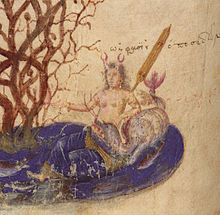Thalassa (mythology)

Thalassa ( ancient Greek - Doric dialect and modern Greek Θάλασσα Thalassa ; ancient Greek- Attic dialect Θάλαττα Thalatta "sea") is the embodiment of the sea in Greek mythology .
According to Hyginus Mythographus , her parents are Aither ("ether") and Hemera ("day"). It corresponds above all to the (inner) Mediterranean in contrast to Pontos , the "high seas", and Okeanos , the outer ocean. After the union with Pontus, she gave birth to all life in the seas and thereby becomes the mother of fish. In Nonnos she appears as the mother of Aphrodite , whom she received from Uranus . She is also said to be the mother of Aigaion , the god of sea storms. According to Diodorus , she is the mother of the Telchines of Rhodes . You cannot assign a certain figure to it. In some depictions she appears as a transparent woman made from seawater, in later as a woman with crab claws in her hair. She is also occasionally depicted with a belt made of algae or the rudder of a ship in hand.
literature
- Herbert A. Cahn: Thalassa . In: Lexicon Iconographicum Mythologiae Classicae (LIMC). Volume VIII, Zurich / Munich 1997, pp. 1198–1199.
- Ernst Kuhnert : Thalassa . In: Wilhelm Heinrich Roscher (Hrsg.): Detailed lexicon of Greek and Roman mythology . Volume 5, Leipzig 1924, Sp. 442-447 ( digitized version ).
Web links
- Thalassa in the Theoi Project (English)
Individual evidence
- ↑ Pedanius Dioscorides - Der Wiener Dioskurides, Codex medicus Graecus 1 of the Austrian National Library Graz: Academic Printing and Publishing Agency 1998. Excerpt from fol. 391 verso (volume 2), commentary on p. 47 and 52. ISBN 3-201-01725-6
- ↑ a b Christopher A. Weidner: The encyclopedia of mythology . tosa GmbH, Fränkisch-Crumbach 2013, ISBN 978-3-86313-303-0 , p. 256 .
- ^ Hyginus Mythographus Fabulae praefatio.
- ↑ Nonnos Dionysiaka 12:43
- ^ Ion from Chios fragment 741
- ↑ Diodorus 5.55